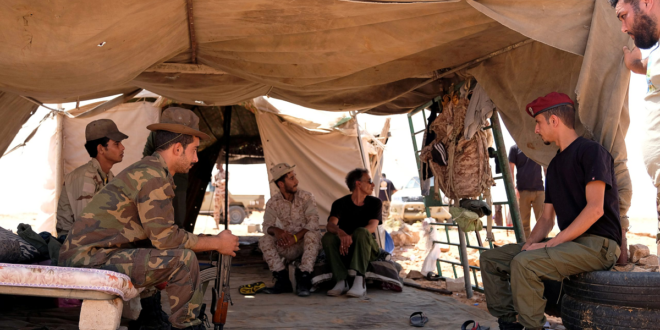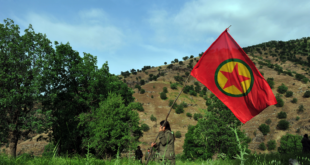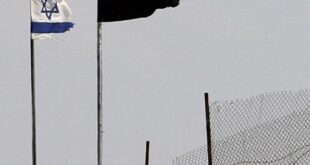The war in Ukraine has brought Yevgeny Prigozhin and his Wagner Group to the forefront, with the United States now focusing on countering their presence beyond Ukraine, particularly in Africa.
One theatre Washington is now prioritizing as part of this burgeoning effort is Libya, where Russia’s influence is mainly projected through Wagner mercenaries. There, Wagner has acted as the Kremlin’s surreptitious foreign policy tool for over three years, significantly expanding its footprint in the country after supporting General Khalifa Haftar in his failed attack to capture Tripoli and oust Libya’s United Nations-recognized government in 2019. Quelling Wagner’s influence in Libya will be challenging, as the US must address Libyan realities and unite Europe and regional powers to support its foreign policy endeavor.
The Wagner Group’s activities in Libya have been multi-faceted, including military operations, military hardware maintenance, political advisory services, and social media disinformation and influence operations. After Haftar’s failed attack in 2019, Wagner’s profile grew substantially, with the group shifting to fulfill Russian strategic goals.
Since the October 2020 ceasefire, Wagner mercenaries have entrenched in the south and east of Libya, taking over military airbases and encamping near oil fields and natural resource infrastructure. This development dovetailed with blockades imposed by Haftar and his rag-tag army on oil exports. The latest blockade—unilaterally imposed through the first half of 2022 by Haftar—served Russian geopolitical interests and harmed US interests by stifling oil supplies to Europe and exacerbating global inflation.
Directly challenging Russia’s influence in Libya is difficult for the United States. Wagner’s positioning advances Russia’s goals while safeguarding the group’s presence. A military offensive to remove Wagner, already an unlikely prospect, is less appealing, as vital oil infrastructure could become collateral damage. Moreover, Russia’s proximity to oil facilities allows them to project the narrative that the group can independently threaten European oil supplies. While this scenario is unlikely, the perceived threat has contributed to a passive European tolerance of Wagner’s presence in Eastern and Southern Libya. Privately, this inaction is rationalized by EU countries as pragmatism, since the Russian presence, along with Turkey’s footprint in Western Libya, are seen as preserving Libya’s peace.
Neglected in the thought process is the fact that Wagner in Libya is not just an unfunded and static holding force, but a central node of influence that has logistically enabled the amplification of Russian influence in Burkina Faso, the Central African Republic, Chad, Mali, and Sudan—all while buttressing Haftar’s Libyan National Army’s (LNA) nominal hold over Libya’s south and east.
Yet, Wagner’s combat readiness and utility to the LNA, and the threat it represents to Libya and the broader region will decline if funding and ability to mobilize resources diminish. Maintaining Wagner’s presence as a holding force may become increasingly challenging for a sanctioned, cash-strapped Kremlin over time. However, to date, this financial impediment is not a problem for Russia. This is due to limited oversight on the process of the LNA’s salary allocation. It is widely believed that the Wagner mercenaries’ presence in Libya has been funded through monthly lump-sum transfers of oil revenues to Haftar by the Central Bank of Libya (CBL). This needs to change if Wagner’s hold in Libya is to be challenged.
To address this, the United States must also confront the skeletons in Libya’s state coffers. Since 2016, Haftar has leveraged his control over an Eastern breakaway branch of the CBL to import well over 10 billion counterfeit dinars printed in Russia. The same CBL branch accumulated more than $23 billion in debt through a pyramid scheme of bond sales. The parallel Russian currency and amassed debt partly went to fund Haftar’s rag-tag army, but also served as leverage over Haftar by his foreign sponsors. Letters of credit were issued to cover Haftar’s military imports and fake currency was swapped for dollars on the black market to cover Haftar’s foreign expenses.
In this context, Haftar’s dependence on Russian banknotes and his yet-unquantified Russian bill is leverage that Moscow holds over him and Libya’s future. The likelihood Haftar’s independent funding mechanisms will once again be utilized still exists, particularly if monthly CBL payments to the LNA are scrutinized. This makes negotiating the LNA’s decoupling from Russia not just a military question, but a political and economic one for Washington.
Nevertheless, the US’s foreign policy focus on countering Wagner has been heeded by Libyan stakeholders, who seek to publicly distance themselves from Russia to obtain greater international support. Dbeibah and his Tripoli-based government were first to unambiguously position the GNU as strongly anti-Russia, despite Moscow’s attempts to diversify its contacts in Western Libya.
Fathi Bashagha, a rival prime minister based in Eastern Libya, has also sought to distance himself from Moscow—despite the latter’s initial endorsement of his parallel government established in early 2022. Sources tell me that even Haftar is now considering taking steps to distance himself from the group, particularly following the US Treasury designation of the Wagner Group as a Transnational Organized Criminal Organization in January 2023.
To capitalize on this burgeoning momentum, the US must overhaul its Libyan policy. So far, Washington’s increased engagement is reactive and borne out of geopolitical necessity. The US wants to reassert its position along NATO’s southern flank as Russia’s presence in Libya and the Sahel has become a threat. The urgency is compounded by threat perceptions that interpret Russia’s Libyan presence as geared towards enhancing operational deployment in inland Africa, as well as a securing a warm-water port in the Mediterranean. When viewed in conjunction with the threat of Russian-induced oil markets disruption, there is sizeable bipartisan American agreement on the importance of mitigating the Russian threat in Libya. Central Intelligence Agency Director William Burns’ visit to Libya in January, which reportedly included meetings with Dbeibah and Haftar, was meant to scope these stakeholders’ willingness to distance themselves from Wagner.
However, the US must realize that efforts to counter Wagner cannot be dissociated from resolving Libya’s political impasse. Currently, the US is trying to restart economic talks on Libya, all while enhancing multilateral efforts between European stakeholders, as well as Ankara, Abu Dhabi, Cairo, and Doha. A P3+2+4 meeting on Libya, which has instituted this dialogue format between these capitals, was held in Washington on February 22. However, forging international consensus between these stakeholders will require more forceful US follow-up and transatlantic consensus on change in Libya. The US involvement in the economic track, coupled with scrutiny on CBL-disbursed funds, could indeed culminate in depriving Wagner’s contingent in Libya of their funding. This would not just challenge the Wagner Group’s military footprint in Africa—it could also support the withdrawal of foreign forces and mercenaries ahead of planned Libyan elections. Building on this, Washington needs to go the extra mile by focusing on insulating Libya from foreign interference to support the multilateral enforcement of a United Nations (UN) roadmap that stabilizes the country.
American efforts to resolve the political deadlock in Libya will face many challenges. Isolated, Russia is likely to obstruct UN peace efforts by using its veto power within the Security Council. Even if a sanitized UN Security Council resolution passes, alternative mechanisms should be considered in order to better anchor the UN’s nascent peacemaking efforts under UN Special Representative to Libya, Abdoulaye Bathily. This is only possible if the US develops its Libya policy more substantively and positions itself as an arbiter that leverages coercion and incentives to influence allies and partners in the region into following its lead (under the UN’s aegis). Absent such an effort, Russia will simply weather the current storm, and Libya will be left open to the same multipolarity and transactional opportunism that curtailed its transition, which Moscow, among many, has thrived on.
 Eurasia Press & News
Eurasia Press & News




